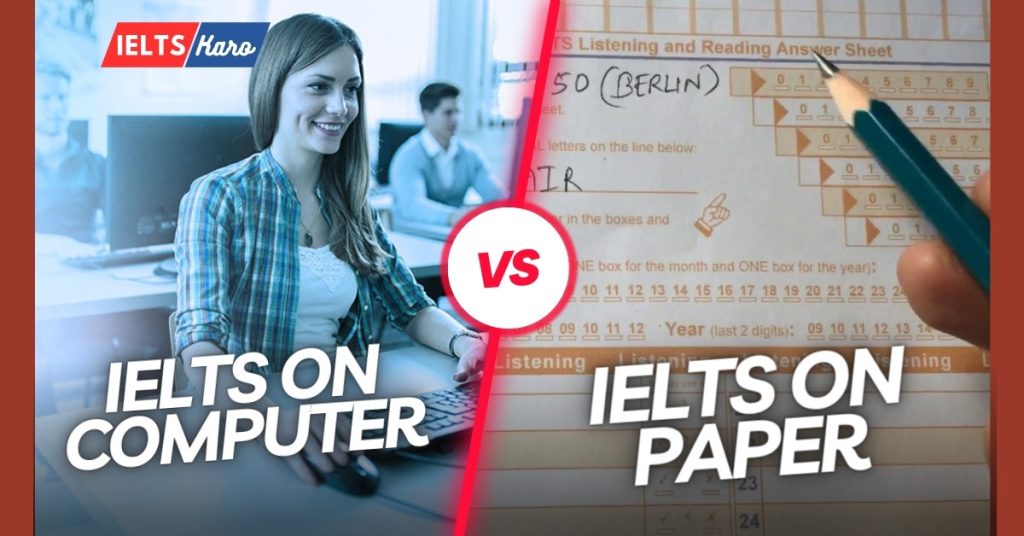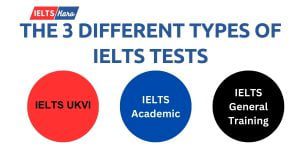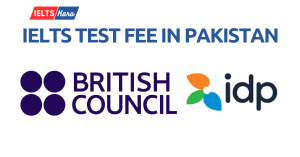Alright, so ever since I started teaching IELTS, if there is one question that my candidates ask me all the time, it would be:
“Sir Yasir, is IELTS on Paper better than IELTS on Computer?”
Before I move on, let me set the tone straight; NO! There is NO difference between IELTS on computer and IELTS on paper. I have made a detailed video about this topic and here it is:
5 Myths of Computer-Delivered IELTS Debunked Video
Myth #1. IELTS on Computer Test Format is different than paper-based
The only difference is the test experience, that’s it. Everything else, including the marking criteria, level of difficulty, time duration, test-format and word count for the writing part, is the SAME. Regardless of how you appear for IELTS, whether on computer or on paper, both are equally accepted. The TRF (Test Result Form) that you get, will not indicate how you appeared for the test.
Just like the paper-based, you will get a separate piece of paper and pencil to jot down your notes and thoughts during the test, starting from the Listening module, till Writing.
Myth #2. I can opt for Some Parts of IELTS on computer, and the rest on Paper
False! All modules will take place on paper if you go for a paper-based IELTS, and the same is true if you appear for a computer-based version.
You cannot (at least not till yet) select the modules that you want to appear for on paper and the rest on computer.
Myth #3. The IELTS on Computer is Easier than the IELTS on Paper test
No! Regardless of the medium that you choose, the level of difficulty, as stated in myth #1, will be the same. However, there is an exception here.
If you are computer-literate, have amazing typing speed, and are comfortable spending 2 hours and 30 minutes in front of the screen with no breaks in between, then IELTS on Computer may be a better option for you. Some people just don’t prefer appearing for the exam on computer, as they want to solve it on paper.
However, with the IELTS on computer, you do not have to count the words for both task of writing (Task 1 and Task 2). This somewhat does help because you can see the word count as you type.
Myth #4. I Need to Own a Computer for the Test
You will need a PC/laptop (yours, or your friend’s) for preparation, but not for the actual test. The test will take place inside the British Council or IDP examination hall and you will be provided with a functioning computer, a noise-cancelling headphone, and a sound-proof environment to ensure there is no disturbance.
Myth #5. It Will Take the Same Amount of Time to Get my Results
Glad to tell you that you’re wrong 😉
You will get your results within 3 days if you appeared for IELTS on computer, and around 2 weeks if you appeared using paper-based.
FAQs:
Is there a difference in the test format between IELTS on computer and IELTS on paper?
No, there is no difference in the test format between IELTS on computer and IELTS on paper. Both versions have the same marking criteria, level of difficulty, time duration, and word count requirements for the writing section. The primary difference is the test experience. Whether you choose to take the test on paper or on a computer, both are equally accepted and your Test Result Form will not indicate the test format you chose.
Can I take some parts of the IELTS test on a computer and others on paper?
No, you cannot mix and match test formats for different modules. If you choose to take the paper-based IELTS, all modules will be on paper. Similarly, if you opt for the computer-based IELTS, all modules will be on the computer. Currently, there is no option to take some parts on a computer and others on paper.
Is the IELTS on computer easier than the IELTS on paper?
No, the level of difficulty is the same for both the computer-based and paper-based IELTS. However, your personal preference and comfort level with using a computer can make one option seem easier than the other. If you are comfortable with computers, have good typing speed, and can focus on a screen for 2 hours and 30 minutes, you might find the computer-based test more convenient. Additionally, the computer-based test displays a word count for the writing tasks, which can be helpful.
Do I need to own a computer to take the IELTS on computer?
No, you do not need to own a computer to take the IELTS on computer. The actual test is conducted in a British Council or IDP examination hall where you will be provided with a functioning computer, a noise-cancelling headphone, and a sound-proof environment. You will only need access to a computer for preparation purposes.
How long does it take to get results for IELTS on computer compared to IELTS on paper?
Results for the IELTS on computer are typically available within 3 days after the test, whereas results for the paper-based IELTS usually take around 2 weeks to be released. This quicker turnaround time for computer-based test results can be a significant advantage if you need your scores promptly
Do We Get Rough Paper in IELTS Computer-based Test?
Yes, you do! The moment you sit in the examination hall before the start of the exam, you will be provided with a rough paper and a pencil, which will definitely aid you in taking notes while you’re answering questions on the computer.
Is IELTS Computer Based from Home?
IELTS started a pilot project of taking tests on computer from home in 2022, but it is in its infancy stages. As of date, you sill have to take this test from one of the IELTS test centers.
What are the Disadvantages of IELTS Computer-Based?
To be honest, there are more benefits than disadvantages. However, with that being said, if you are not well-versed in using computers, have a typing speed of at least 30 WPM (Words per minute), or do not have the stamina to look at the screen for 2 hours and 30 minutes with no breaks, then IELTS on Computer is probably not for you. It is better if you opt for IELTS on Paper.
How is Computer-Based Marked?
Exactly the same way IELTS on paper is marked. No difference in the time and marking criteria.





